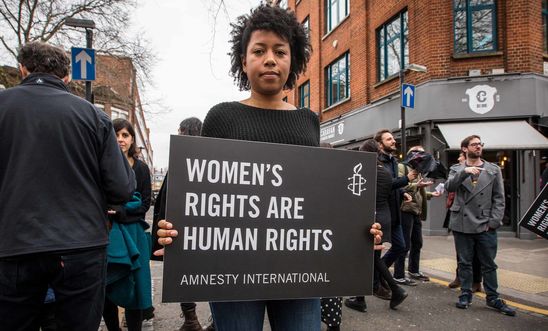
Make Europe a better place for all women and girls

Europe will not be the same after COVID-19. The pandemic is an unprecedented crisis with grave consequences for women and girls, who are already facing increasing insecurity and violence.
Paradoxically, this dark time gives us an opportunity to do more to overcome discrimination and inequality.
States must hear women’s voices and make Europe a better place for all women and girls.
Focussed government action
A new guide from us, Women's Link Worldwide and the International Planned Parenthood Federation provides governments with a roadmap for taking the necessary steps to protect the rights of women and girls, who are disproportionately affected by the pandemic – especially those experiencing intersecting and persistent forms of discrimination.
Domestic and sexual violence
Even before the COVID-19 crisis, 1 in 5 women suffered violence from their partner at home in Europe.
Lockdowns and isolation to contain the spread of the virus have exposed women and girls to increased risks of domestic abuse, and often cut them off from much-needed support.
Some European countries have taken measures to support women and girls at risk of domestic violence, but the pandemic has exposed the existing shortcomings of the responses in place – which in turn are limiting the capacity to react to the overwhelming needs during the crisis.
Data shows that reports of violence against women, and particularly domestic violence, have increased alarmingly in several countries. According to recent data by the World Health Organization, emergency calls have risen by up to 60 percent compared with last year in many European countries. In some countries, the authorities point to a decrease in domestic violence incident reports, which may indicate limited reporting options for women living under the same roof as their abuser.
For those affected by gender-based violence, including sexual violence, high levels of impunity and barriers to access to justice, have been one of the greatest challenges in the region even in pre-COVID-19 times. It is crucial that while taking appropriate public health measures, states must also live up to their international obligations to ensure due diligence in the investigation and prosecution of all gender-based violence cases, both during lockdowns and after restrictions are lifted.
Sexual and reproductive rights
Whilst some countries have enacted specific measures to ensure safe and timely access to essential sexual and reproductive health services, products and information during the pandemic, many have not.
Some countries appear to be using the restrictions as an opportunity to further undermine or restrict access to sexual and reproductive rights.
Hospitals and clinics have reduced sexual and reproductive health services to a bare minimum, or closed them altogether due to staff shortages and reassignments, among other reasons. In many places, accessing normal clinical services has become extremely difficult.
“European governments must not exacerbate the harm caused to women by the COVID-19 crisis by failing to guarantee access to essential sexual and reproductive healthcare,” said Caroline Hickson, Regional Director of IPPF European Network.
“Restricting essential services is putting the lives, health and wellbeing of hundreds of thousands of women at risk. Countries that put care first have taken steps to protect the safety and freedom of women and girls. It can be done; there is no excuse to let women and girls down.”
After COVID-19
All this is happening against the backdrop of grim economic prospects for millions of women and girls in Europe, post-COVID-19. The aftermath of the health crisis is expected to gravely impact women’s livelihoods, particularly those working in the care or informal sector and those who are already experiencing marginalisation. Women and girls’ needs and rights must be placed at the centre of the responses to COVID-19 and beyond.
Women who face multiple and intersecting forms of discrimination, such as Roma, migrant or asylum-seeking women, sex workers, women with disabilities, trans women and others in situations of marginalisation, face an increased risk of being targeted by state agents and suffering harms including racial profiling. It is crucial that states ensure increased police powers do not affect these women disproportionately.